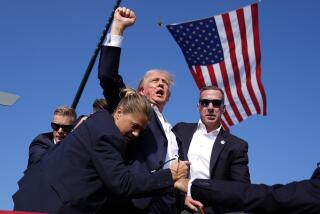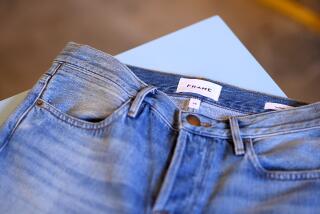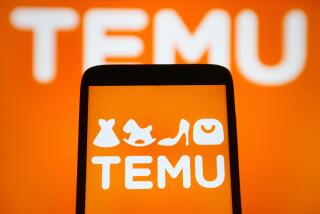Chinese maker of U.S. Olympic uniforms baffled by backlash
- Share via
DALIAN, China — If Horatio Alger had spoken Mandarin he would have loved the rags-to-riches tale of garment maker Li Guilian.
A farmer’s daughter who got her start stitching aprons in the countryside, she has built a $300-million company that’s listed on the Shanghai Stock Exchange. Now 66, Li employs 10,000 workers sewing fine clothing for some of the world’s most famous brands and powerful people.
Chinese President Hu Jintao and fellow Politburo members are loyal customers of her firm, Dayang Trands. So are U.S. billionaires Warren Buffett and Bill Gates. Former President George H.W. Bush donned one of the company’s suits.
Dayang is also the manufacturer behind those snappy blue blazers and white slacks designed by Ralph Lauren for this year’s U.S. Olympic team. And that’s where the story turns ugly for the hard-charging entrepreneur known by many here as “Chief Li.”
Over the past few weeks she’s watched the American backlash over those uniforms’ made-in-China labels with a mixture of astonishment and dismay.
“I have a simple question,” said the bespectacled, raspy voiced Li in an interview at company headquarters in this industrial seaside city in northeastern China. “Can America really make the suits we make? We have cheaper costs here so you can have cheaper prices in America.”
U.S. officials, she said with a wry smile, really ought to get a grip. “Pay attention to the performances of the U.S. athletes and not their clothes,” she said.
The dust-up comes at a time when American unemployment remains stubbornly high, fueling tension over China’s massive trade imbalance with the U.S.
While Ralph Lauren and the U.S. Olympic Committee try to stem the public relations crisis, many Chinese like Li are baffled by the controversy.
Most garment manufacturing left U.S. shores long ago. Low-cost Chinese goods, they reason, have helped American families stretch their dollars.
Nearly half the clothing in the U.S. today is made in China, while nearly all the rest is manufactured in other countries such as Vietnam and Bangladesh, said Daniel Ikenson, an economist at the Cato Institute in Washington.
China’sapparel exports in 2010 were worth $121 billion. Despite rising wages and competition from other developing nations,China’smanufacturing infrastructure remains unrivaled, experts say.
“Whether the U.S. could ever do again what China is doing now, it seems highly unlikely in the next decade or two,” said Ken Perkins, president of research firm Retail Metrics in Swampscott, Mass. “There are virtually no firms that would be willing to invest in new plants, spinning and weaving infrastructure in the U.S.”
It would be hard to compete against companies such as Dayang, whose founder Li is the embodiment ofChina’seconomic miracle.
Descended from a long line of farmers, the country girl spotted opportunity 33 years ago as Communist China was beginning to test free-market reforms. She opened an apron and tablecloth factory in her home village of Yangshufang, gradually shifting to more complex garments.
Today the company makes 5 million suits a year — a good portion of them for American brands includingMacy’s, DKNY and Banana Republic.
Li has grown in stature as well. She is now one of 3,000 members of the National People’s Congress, an elite group of party delegates.
Speaking inside a private, wood-paneled tearoom inside her headquarters this week, Li, looking elegant in pearls and a diamond encrusted watch, defended her company’s success.
“Don’t you think we deserve credit?” she asked a reporter. “We’ve made so many customers happy over the years.”
Li said her skilled workers earn $6,300 to $9,500 a year — good by local standards, but a fraction of American labor costs. Elevator music piped into the factory floor to soothe the workforce is all but drowned out by the relentless hum of sewing machines.
Rows of silent employees, many wearing flip-flops, process 100 suits an hour, up to six days a week. On a recent afternoon, the factory floor was sweltering, despite an abundance of whirring fans.
She said her workers could handle the demands because they were eager to work and earn money.
“They can eat bitterness,” Li said, using a popular phrase to describe the ability of the Chinese people to endure hardship.
From Li’s perspective, Dayang is a vital link in the global supply chain, manufacturing high-quality products quickly for leading international brands. That allows customers like Ralph Lauren to focus on their strengths: designing, branding and retailing.
“Do you really think it’s possible to reverse roles today? Designing in China and manufacturing in the U.S. is impossible right now,” Li said.
Not content simply to manufacture for others, Li in 1995 launched her own Trands label of luxury suits after apprenticing with experts in Japan, Italy and the U.S. She said she also sought help from an Armani designer.
Today Trands cashmere suits fetch from $950 to $2,800 in stores. Li has ambitions of taking it global.
Some of her top buyers are the most powerful men in China, including President Hu, who is said to wear the suits when traveling abroad.
Government officials can get a fitting at a private Trands boutique guarded by soldiers at the five-star Jingxi Hotel on the west side of Beijing.
But Li’s biggest coup may have been Buffett. Tipped off by a friend several years ago that the famous American investor would be visiting Dalian, she sent tailors to take his measurements and make him a custom suit. Buffett was so impressed with the fit and quality that he recommended the brand toMicrosoft Corp.Chairman Gates.
Dayang stock soared in 2009 when Buffet appeared in a promotional video praising Li and her clothes. She’s now a regular at the annual meetings of Buffett’s investment company, Berkshire Hathaway in Omaha.
“Warren Buffett made people think about ‘Made in China’ differently,” Li said.
Li said she hasn’t heard from Ralph Lauren, a company she’s manufactured for since 2005. She said Dayang typically works through third-party sourcing companies that contract with famous labels.
Ralph Lauren did not respond to a request for comment.
Li said that a few days after the made-in-China controversy erupted, the American sourcing company that brought Ralph Lauren and Dayang together for the Olympic uniforms asked Li to hand over the thousands of paper templates used to construct the athletes’ garments.
“We refused,” Li said. “We felt that was our intellectual property.”
Meanwhile, China selected a homegrown Shanghai clothing maker to outfit its Olympic athletes in red and yellow. No one seemed to care that the wool came from Australia.
Asked if Chinese people would feel equal outrage if their nation’s uniforms were labeled “Made in the U.S.A,” Li barely hesitated.
“So long as they’re designed in China I think people here would accept it,” she said. “Then it would still represent the Chinese spirit. When people see the uniforms at the Olympics, they’re only going to see the country’s logo.”
Dayang factory worker Yang Xinhua said he’ll be watching with excitement when the U.S. team struts its stuff Friday in the opening ceremonies.
“For sure I’m going to feel proud, we made those things,” said Yang, a veteran line inspector who supervised 150 workers over six months tailoring 2,200 uniforms. “It was stressful. The athletes were very different sizes.”
Tommy Yang in the Times’ Beijing bureau contributed to this report.
More to Read
Go beyond the scoreboard
Get the latest on L.A.'s teams in the daily Sports Report newsletter.
You may occasionally receive promotional content from the Los Angeles Times.







